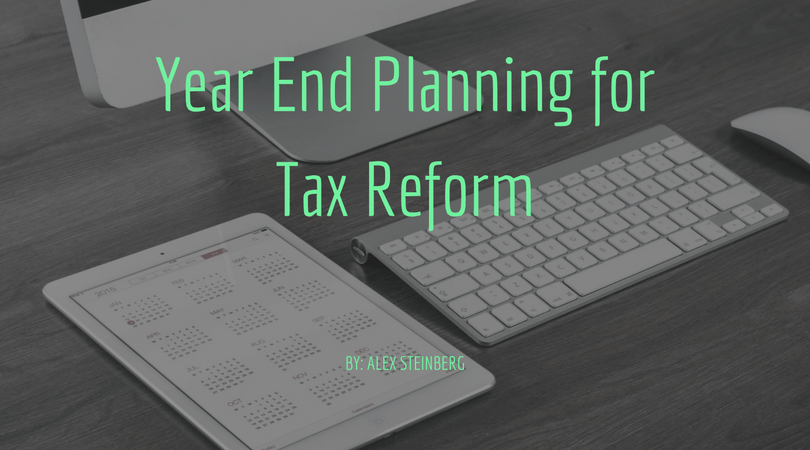The 2017 tax year is rapidly coming to a close and we have now seen the Senate and House pass different versions of tax reform bills. While the two bills have some key differences that need to be ironed out, we do know that major changes are forthcoming. So how do you go about planning for this uncertainty? Let’s look at a few things you can start preparing for before the year end. Please do note that this article is written as of 12/14/17 and is subject to change depending on the outcome of the final tax reform bill.
- Play the rate game. So, what does this mean exactly? If all else is equal with your taxes this year vs. 2018, your tax rate will most likely be lower in 2018. So, accelerate deductions and defer income. Accelerate deductions by making purchases or recurring payments in 2017 vs. 2018 (ex: new computers, paying January 2018 bills in December 2017, etc). Defer income by not billing clients or your customers until late December 2017. Remember, there is a tax rule that prevents “putting a check in the drawer” and deferring income.
- Pre-pay your individual state and local income taxes. Each year, I work with business owners and other clients to analyze whether making state and local income tax payments by year-end vs. in January of the next year makes sense. The reason we analyze this is because some taxpayers are in the Alternative Minimum Tax (AMT) and the deduction is essentially “eliminated” from their taxes. The new proposed tax bill is limiting the deduction for these plus real estate taxes to $10,000 starting in 2018. Regardless of if you are in AMT or not, paying your state and local income taxes by December 31, 2017 is a smart thing to do for most. However, if your combined deduction is less than $10,000 in 2017 then it may make sense not to pre-pay unless you want a bigger potential deduction this year. Make sure to analyze if you are in the AMT in this scenario before making any type of payment.
- Consider pre-paying your January 2018 mortgage payment. This one is a little tricky. If you know your itemized deductions will be lower than the new thresholds ($24,400 MFJ or $12,200 single), then any benefit you receive from your mortgage interest payment will be nullified in 2018. So, paying an extra payment in 2017 will net you 13 mortgage interest payments instead of 12 and an extra deduction against your 2017 taxes.
- Re-think your self-employed health insurance plan. As of now, the deduction for medical expenses is up in the air. If you are self-employed and have your own individual health insurance plan, consider taking a higher premium plan for 2018. If the new tax bill passes, out-of-pocket medical costs may be rendered non-deductible. However, the premiums paid will be deductible against business income.
The above tips are just scratching the surface of how to plan for the new tax bill. If you would like to discuss a more detailed plan based on your personal situation or have questions, please contact me directly!






